Part One
The beginning of the age of oil in 1854 and the subsequent discovery of petroleum in Pennsylvania in 1859 turned oil into the most important source of energy in the world and the major industry in the 19th century. In a period of fewer than four decades after Mozaffar ad-Din Shah Qajar granted the oil concession to William Knox D'Arcy, Iran’s economy became dependent on petroleum.
Since then, the country’s politicians and economists have constantly discussed the question whether oil, as a vital resource, has contributed to Iran’s economic growth or it has worked as a factor in dependence on a crude source and as a way to generate an income for the governmentsand has eliminated the need for the other factors of economic growth.
Known as a milestone in the history of Iran’s foreign relations during the Qajar dynasty, the D'Arcy oil concession has had impacts on the economy and has also played a significant role in Iran’s domestic policy and foreign relations. The major developments surrounding the D'Arcy concession include the abrogation of the concession by Reza Shah in 1932, Britain’s complaint to the United Nations, signing a new agreement in 1933 after revisions, and, finally, the nationalization of Iran’s oil industry in 1950.
A better and deeper understanding of the D'Arcy concession requires exploration and research into the reasons and grounds that made Mozaffar ad-Din Shah grant the concession to British William D'Arcy, who not only did not come to Iran to sign the treatybut never paid any visit to Iran.
- Iran’s internal situation: a combination of factors such as the Qajar government’s budget deficit, the supply of financial resources by granting concessions, corruption of the royal court and authorities and luring the rulers into signing the treaties, ignorance, lack of knowledge and scientific expertise, and the absence of technology in the oil industry, the need for huge investment in oil drilling and extraction, uncertainty about the existence of oil resources in the country, job creation and development of the road network and construction, cultural mixing after the presence of foreign engineers and workers in Iran.
- The global situation and Iran’s foreign relations: formation of the process of a change in the fuel resources from coal to oil, the UK’s growing need for oil resources as the fuel for running the ships and maritime flotilla changed from coal to oil, the increasing value of petroleum in the US and the UK, the attention that oil companies paid to the faraway territories to find new resources in various parts of the world, the British government’s push to encourage Iran to grant the concession, the Russian government’s attempt to enter the competition and its reaction, Iran’s growing geopolitical importance considering the discovery and extraction of oil.
- The role of diplomacy institution in the negotiations, the challenges and consequences: The Ministry of Foreign Affairs’ participation in the negotiations, the correspondence that Iran’s Embassy in London was involved in and the meetings held by the Embassy, the letters from the British Embassy in Tehran, the documents on procedures for preventing mine tax payment delays, the letters on continued measures to restore the government’s rights from the companies, the documents on disputes with Bakhtiari ethnic groups over land acquisition for drilling, exploration, and the ways to resolve them.
The D'Arcy oil concession has been a subject of research from various aspects. This study explores the concession based on the documents available at the Iranian Foreign Ministry’s Documents Center. The Foreign Ministry’s Documents Center houses a collection of 50 million documents, providing a treasure trove for the researchers. The search of the word “D'Arcy” in the archive of the Documents Center produces 119 results.
First, the document available at the Documents Center is analyzed. In the second part, its important and influential articles are evaluated, and the third part delves into a series of documents about the D'Arcy concession available at the Documents Center.
A: Introduction of the D'Arcy oil concession document
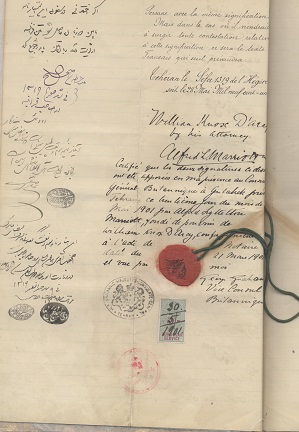
The document has been written in a notebook without cover, 20*32.5 cm, with 7 pages (the first and the two last pages have been left blank), containing half-sheet lined papers, handwritten in the Persian and French languages in black ink, with the Ministry of Foreign Affairs’ wax seal. The document has a preamble and 18 articles and has been signed in Tehran on May 28, 1901 (Safar 9 of 1319 of Lunar Hijri calendar).
The following individuals have put their signatures to the appendix of the document:
- signature of Alfred Lyttelton Marriott, attorney of William Knox D'Arcy;
- signature of George Grahame, Britain’s vice-consul in Tehran;
- confirmation from Mozaffar ad-Din Shah with the sentence “It was observed. This is correct. In the month of Safar in 1319 in Sahebqaraniyyeh in the year of the Ox”;
- confirmation from Prime Minister Mirza Ali Asghar Khan Atabak with the sentence “This is the concession document on wax and natural mineral oil which has the holy signature of master of the servants, His Majesty”;
- confirmation from Foreign Minister Moshir od-Dowleh with the sentence “This concession document on wax and mineral oil, which has been signed by His Majesty, has been registered in the Ministry of Foreign Affairs of the Iranian government with number 812 in the month of Safar of 1319”;
- verification of the signature of Moshir od-Dowleh with the seal of a person named Nizamuddin with the sentence “The contents written here are correct.”
B: Major articles of the document
According to Article 1, D'Arcy is granted the privilege to search for and exploit petroleum throughout the whole extent of Iran for a term of sixty years. The northern parts of Iran were excluded from the concession to avoid a reaction from the Russian government.
What is remarkable is a report from Iran’s Embassy in Petersburg, cited by Novye Russia newspaper on March 23, 1902, following the news of negotiations between D'Arcy and Iran on a contract. Referring to the report of the contract as bad news for the interests of Russia, the newspaper said the concession would allow Russia’s rival to consolidate its influence in those regions.
“The right to prospect, explore, exploit, extract, transport and sell natural gas, petroleum, bitumen, and natural wax throughout the whole extent of Persia for a term of sixty years as from this date. The privilege excludes the provinces of Azerbaijan, Gilan, Mazandaran, Khorassan, and Astarbad,” the Russian daily said.
The other key point in the document is the quality of handing over the territories. The uncultivated lands were given to the engineers for free, and it was emphasized that the other cultivated lands must be purchased from the State or the owners. This article later became a source of disagreement and disputes with the Bakhtiari clan, resulting in extensive negotiations and correspondence, whose documents will be presented.
“The Imperial Persian Government grants gratuitously to the Concessionnaire all uncultivated lands belonging to the State which the Concessionnaire's engineers may deem necessary for the construction of the whole or any part of the above-mentioned works. As for cultivated lands belonging to the State, the Concessionnaire must purchase them at the fair and current price of the province. The Government also grants to the Concessionnaire the right of acquiring all and any other lands or buildings necessary for the said purpose, with the consent of the proprietors, on such conditions as may be arranged between him and them without their being allowed to make demands of nature to surcharge the prices ordinarily current for lands situate in their respective localities. Holy places with all their dependencies within a radius of 200 Persian archines are formally excluded.”
Another article in the document that became a source of conflict and forced the country’s diplomatic organization to play a role related to the establishment of a company and paying the Iranian government a sum of 16 percent of profits of the enterprise.
“It shall be stipulated in the contract between the Concessionnaire, of the one part, and the company, of the other part, that the latter is, within the term of one month as from the date of the formation of the first exploitation company, to pay the Imperial Persian Government the sum of £20,000 sterling in cash, and an additional sum of £20,000 sterling in paid-up shares of the first company founded by virtue of the foregoing Article. It shall also pay the said Government annually a sum equal to 16 percent of the annual net profits of any company or companies that may be formed following the said Article.”
C: An introduction of the documents about D'Arcy available at the Foreign Ministry’s Documents Center
After pointing to the titles of a few documents, we will try in the second part to take a look at the documents confirming the diplomatic organization’s influential role in the D'Arcy concession case.
- Documents on the measures taken by Iran’s Ministry of Foreign Affairs
* The letter from Foreign Minister Mohammad Ali Ala al-Saltaneh to Iran’s Embassy in London about the order to negotiate with D'Arcy for paying the Government the unpaid tax on oil (1329 Lunar Hijri, file 30, section 7)
* The letter from Nasrollah Moshir od-Dowleh to Iran’s Embassy in London about negotiations with D'Arcy and the oil company for paying the Government the unpaid tax on oil mines (1329 Lunar Hijri, file 30, section 7)
* The letter from Foreign Minister Mohammad Ali Ala al-Saltaneh to Majd al-Saltaneh about the order to summon Ketabchi, obtain the oil company’s bylaws and proclamation, and send them to the Ministry of Foreign Affairs (1329 Lunar Hijri, file 30, section 1)
* The letter for Ala al-Saltaneh and sending the translation of a telegraph message about the need for an inquiry from Seddiq al-Saltaneh about the oil extraction tax payments by D'Arcy (1329 Lunar Hijri, file 30, section 14)
* The letter from the Ministry of Public Revenues to the Ministry of Foreign Affairs about the impossibility of participation of American businessmen in oil extraction because of the validity of the D'Arcy concession and the permission for the participation of American businessmen in the exploitation of mines and woods and extension of the railroad (1329 Lunar Hijri, file 1, section 81)
- Telegraph messages from Iran’s Embassy in London
* A description of the procedure for trading Iran’s shares of D'Arcy oil company in London’s stock exchange and explication of a rise in and trade of the shares (1330 Lunar Hijri, file 49, section 7)
* A description of the continued measures to receive an annual sum of 2,000 tomans in the government’s incomes from the D'Arcy oil company (1329 Lunar Hijri, file 30, section 9)
* The D'Arcy oil company’s inquiry from the engineers in Iran about the annual sum of 2,000 tomans that should be paid to the government for oil extraction (1329 Lunar Hijri, file 30, section 10)
* The report of a visit to London by Ali-Qoli Khan Bakhtiari and two companions and their negotiations with Monsieur Preece, Britain’s former consul general in Isfahan and D'Arcy’s current solicitor (1326 Lunar Hijri, file 1, section 13)
- Letters from the British Embassy in Tehran
* The letter about sending a copy of the contract between D'Arcy and the Bakhtiari chieftains to dismiss the claim made by the chieftains and settle the disputes (1323 Lunar Hijri, file 20, section 2)
* The letter about the D'Arcy oil company’s comments about the possibility of a contract with the individuals to discover oil under the Article 3 of the concession (1324 Lunar Hijri, file 8, section 5)
* The letter about D'Arcy’s dissatisfaction with the rent payments for the lands leased from the Bakhtiari nomads and the sum of money exceeding the 16 percent of profits from oil discoveries (1324 Lunar Hijri, file 8, section 6)
* The British Embassy’s request from Iran’s Interior Ministry to accept the credential of Mr. Dennis (?) as the representative of D'Arcy (1321 Lunar Hijri, file 2, section 7)
- Documents of other departments and ministries
* The letter about Monsieur Ketabchi Khan receiving £20,000 sterling under the contract with D'Arcy, as the oil Concessionaire, and paying the sum to the treasury (1329 Lunar Hijri, file 30, section 5)
* The receipt for twenty vouchers of shares of the South Oil Company worth £20,000 sterling (1329 Lunar Hijri, file 30, section 2)
* The letter from the Ministry of Public Revenues about the rejection of any delay in the payment of tax on Shushtar and Qasre-Shirin oil mines by Monsieur D'Arcy and the necessity of immediate payments to the Ministry of Public Revenues (1329 Lunar Hijri, file 30, section 4)
* The letter from the Ministry of Roads and Streets to Seddiq al-Saltaneh about the necessity of receiving an annual sum of 2,000 tomans in government revenues from D'Arcy’s oil mines (1329 Lunar Hijri, file 30, section 11)
* The letter from D'Arcy, the owner of the concessionaire, to Ala al-Saltaneh about permitting Mr. Reynolds for passing through Shagvand to have access to Dehloran (1322 Lunar Hijri, file 17, section 10)
* The letter from Seddiq al-Saltaneh to the Ministry of Public Revenues about prohibiting Britain from selling the D'Arcy oil concession to the other countries in the presence of Moshir-ol-Molk, the minister plenipotentiary (1329 Lunar Hijri, file 8, section 1)
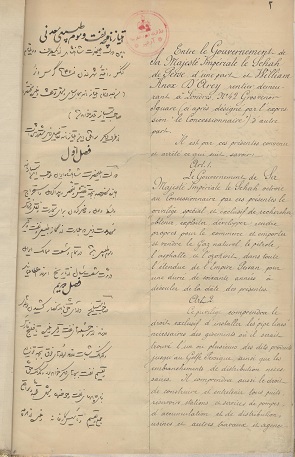
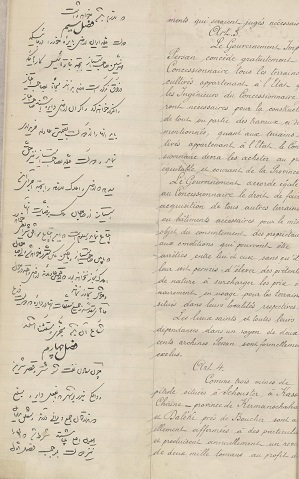
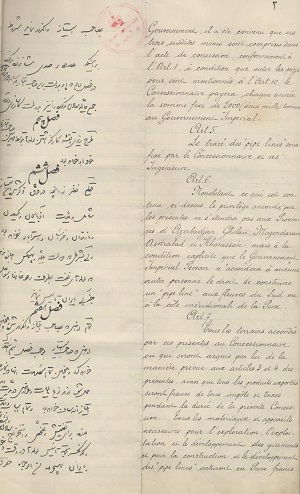
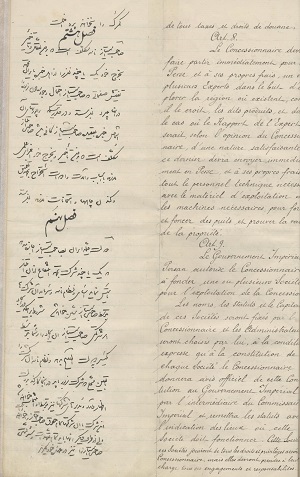
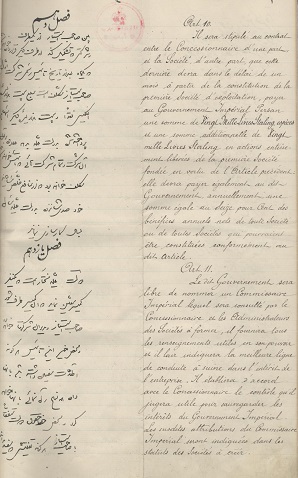
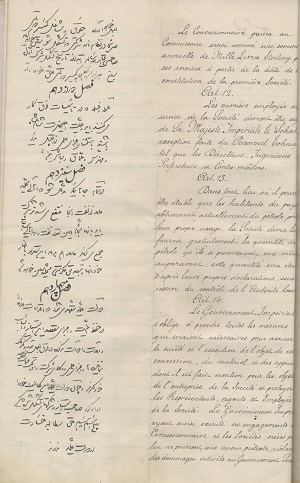
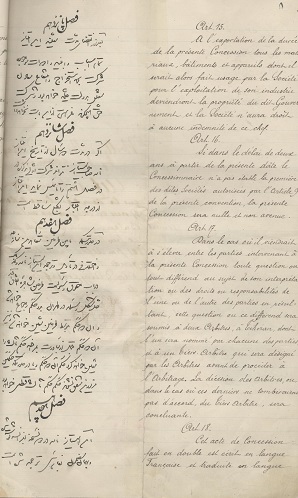
(The opinions expressed are those of the authors and do not purport to reflect the opinions or views of the IPIS)